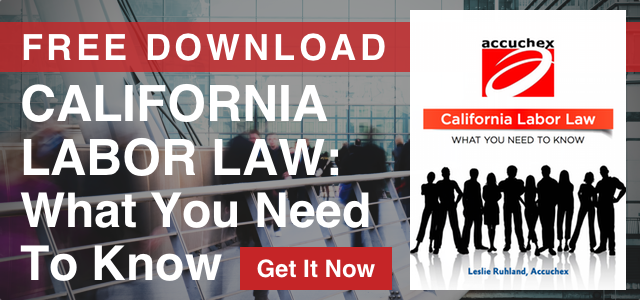The Final Rule of the Fair Labor Standards Act regarding overtime pay and salary thresholds has been in a legal battle since late 2016.

Last month, on June 30th, President Trump’s U.S. Department of Labor (DOL) filed a brief with the Court of Appeals essentially indicating that the DOL will not seek to reinstate the high salary thresholds previously proposed by the Obama administration.
The brief announced the new administration’s position on the ongoing litigation over the FLSA overtime exemption rules originally published last May. The brief included a request that the Court of Appeals also overturn any finding that the DOL generally lacks the power to set different salary levels.
President Trump’s DOL had initially supported the lawsuit but, after Trump’s inauguration, there was very little said or pursued by the administration regarding the suit or the new rules.
Troubled History for FLSA Overtime Exemptions
The DOL under President Obama issued the so-called Final Rule in late 2016 which would have raised the salary threshold for overtime eligibility from $455 per week to $913 per week. This would have amounted to an increase in salary level from $23,660 to $47,476 annually. A number of states and business groups challenged the rule in court, alleging that DOL overstepped its authority, and a federal district court enjoined the rule just days before it was set to take effect.
In blocking the rule, the federal district court judge called into question the legality of any salary threshold, a standard DOL has used as one factor for determining overtime eligibility since the 1940s. The Department of Labor appealed that injunction ruling to the 5th Circuit Court of Appeals shortly before President Obama left office. That appeal has since been on hold while the new administration reviewed its position on the regulations and the lawsuit.
The DOL’s brief signals that, although it is not supporting the specific salary exempt overtime threshold set by the Obama administration, it still expects to use salary as a factor in determining whether employees should be eligible for overtime. This means that, if the Court of Appeals does establish the DOL’s authority to set a salary threshold, the Department of Labor may still want to raise the threshold above the current amount of $23,660.
With the new filing, the DOL appears to be seeking a compromise of sorts. It is arguing that the District Court’s ruling was overreaching by saying that the DOL could not include any minimum salary requirement in its exempt status test. In addition, the DOL also argues that the state plaintiffs’ claims that the new regulations violated the 10th Amendment should also be rejected.
On the other hand, the DOL has asked that the Court of Appeals not address the “validity of the specific salary level set by the 2016 final rule,” stating that there was "no basis to call into question a regulatory test that has been in place since the FLSA’s inception."
Along with their brief filing, the DOL noted that it will start a new rule making process with the goal of revisiting the validity of the proposed $47,476 threshold.
It has been generally believed that the DOL under the new Secretary Acosta would have a more “business-friendly” approach to issues such as overtime salary levels than that of the Obama administration. That being said, the latest actions have left business owners still waiting to see if changes are in store.
In addition, there is still a possibility that the Court of Appeals could agree with the DOL and reverse the preliminary injunction imposed by the District Court’s order. If that were to happen, it is also possible that the 2016 final rules would then take effect immediately. And, although not likely, some fear that the courts may also decide that the rules take effect retroactively to December 1, 2016, the original effective date.
If this scenario were to play out, it would be a major issue for the many employers across the country that waited on making any changes as a result of the injunction. For many businesses, this is a worst-case scenario, but one that may not occur.
What's In The Cards for Overtime Pay
If the Department of Labor decides to make revised changes to the overtime threshold it will unlikely be as high as the original new rules stipulated. It is generally agreed that a change is probably warranted, however, and many critics of the original rule agreed that the $23,660 threshold is outdated.
While critics noted that the Obama administration’s rule was too much, many support some level of increase. A proposed threshold in the range of $35,000 to $38,000 has been discussed in some circles, but Secretary Acosta has given no indication of any actual figures.
The legal challenges aside, employers and business owners are eager to see the issue settled. Regardless of the final outcome, it may prove to be a costly one for employers who already made changes in their overtime pay structure, as well as those who waited. And the longer the final ruling is stalled, the more costly it may become.
According to an article in HR Dive,
There are, however, a few outstanding issues to resolve. First, a group of labor organizations had previously asked to intervene in the suit so it could take over defending the rule if DOL did eventually abandon it. The court has not yet ruled on that motion. The judge also could simply decline the plaintiffs’ permanent injunction request, although employment law experts say that’s unlikely. In addition, there’s now at least one lawsuit alleging that last year's injunction did not actually prevent the rule from taking effect.
For now, employers must continue to simply wait for a resolution.
Deciding On How to Move Forward With Overtime Pay Policy
The challenge remains for most employers to either make changes in their current payroll policies, as many businesses already have, or take a "wait and see" stance in regards to the outcome of the Final Rule.
There are many other new regulations expanding the potential of risk for employers. Since these require new workplace postings, or mandate changes to existing workplace policies, we recommend that all employers consult with experienced employment counsel to ensure compliance.
Accurate and timely management and compliance practices are required for every business and every payroll professional. But there are options.
Accuchex, a reputable payroll management services provider, can not only relieve you of the burden of your ongoing payroll process demands, but can potentially prove to be a more cost-effective solution, as well.
Click this link for your free download of our Payroll Outsourcing Guide. Or click the button below to learn what you need to know about labor law in California. For more information, feel free to call Accuchex Payroll Management Services at 877-422-2824.




